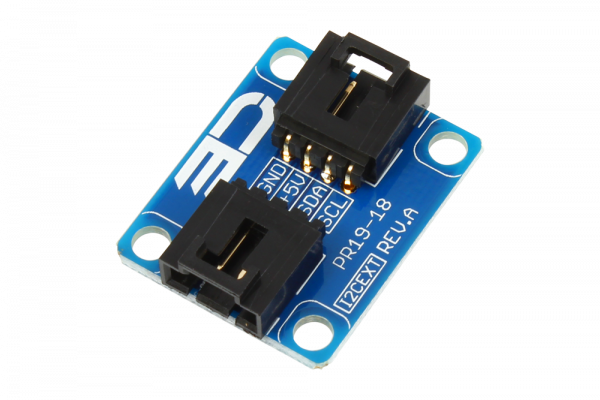
- Order number: NCD-PR19-18
- Manufacturer product ID: PR19-18
This I2C extension adapter is used to join two I2C cables together to increase I2C cable length. While we recommend keeping I2C cables as short as possible, users willing to slow the I2C communication speed can benefit by increasing cable distances. There is no possible way to determine the maximum distances an I2C signal can travel, as different I2C devices have different electrical properties. The I2CEXT adapter is perfect for users who need to experiment with I2C cable distance.
What is the nodeLynk I2C Interface?
NCD is the creator of plug and play modular hardware using nodeLynk, which is hardware I2C Interface connector standard. nodeLynk I2C devices allow you to chain together several devices on the I2C bus, and communicate to each device individually at high speed (subject to the limitations of I2C). The nodeLynk I2C Interface uses a standard 4-Pin I2C Input and I2C Output connector. nodeLynk I2C devices communicate 5V I2C data and provides 5V DC power through this connector. nodeLynk I2C devices use standard I2C communications for all data transport, which is supported by nearly every microcontroller in production today. The nodeLynk I2C Interface is strictly a 5V standard, which is ideal for transport across longer cables. nodeLynk I2C devices always include a 6″ (152mm) 4-conductor I2C cable. nodeLynk I2C Mini Modules always include a 3″ (76mm) 4-conductor I2C cable. Cables and connectors are available separately for designers who would like to include their own nodeLynk I2C Interface into their designs.
Plug and Play Connectivity
nodeLynk I2C devices will plug in to any available nodeLynk I2C Output. This includes just about everything we make in the NCD IoT Category, including all NCD IoT devices. We also manufacture a wide range of I2C adapters that make it easy to plug nodeLynk I2C Devices directly into most computing platforms. nodeLynk I2C Interface adapters are available for Arduino, Banana Pi, BeagleBone, Bluz, ESP8266, Onion Omega, Particle Photon and Electron, PyCom, Raspberry Pi, 2, 3, and Zero, and Windows. We are always working to add new platform support for nodeLynk I2C devices. nodeLynk I2C Interface devices are compatible with just about everything in the microcontroller industry.
Unlimited I2C Expansion
Based on our plug-and-play I2C interface standard, all nodeLynk I2C devices are equipped with a I2C output port, making it easy to expand to a wide variety of sensors, current monitors, relay controllers, PWM controllers, and much more! We are always designing new expansions for our modular plug-and-play I2C framework. We are dedicated to building a product line of interconnected devices to simplify all forms of automation. Re-use or upgrade your hardware in seconds by selecting the modules that best fit your needs, and chaining them together using the included I2C expansion cables!

A Raspberry Pi (above) is connected to a nodeLynk Master adapter. nodeLynk devices are chained to the Raspberry Pi nodeLynk Master using I2C communications. Each nodeLynk device must have a different I2C address for proper operation of the chain. Note that some nodeLynk I2C devices have a fixed address while others allow configuration of the address across a limited range of addresses.
Powering nodeLynk I2C Interface Devices
Some nodeLynk I2C devices require a external power supply, others may be powered through the 4-Pin I2C bus connector at 5VDC, and other devices are jumper selectable between external and I2C bus power. All I2C mini modules are powered through the 5V I2C bus connector, greatly simplifying connectivity.
Features
- Joins Two I2C Cables
- 4 Mounting Holes
- Low-Profile Design
- Experiment with Longer I2C Cables
